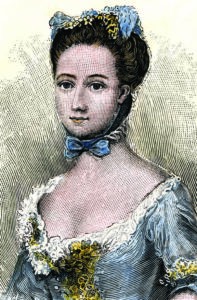Jay Winik’s latest book, Upheaval: America and the Birth of The Great the Modern World, 1788-1800 (HarperCollins), is an ambitious history of three disparate yet surprisingly interconnected societies in an age of revolution: America, France and Russia. While the Americans were hammering out the Constitution, the French Revolution descended into the nightmarish Reign of Terror. Louis XVI and Marie Antoinette were beheaded, and Napoleon waited in the wings. In Russia, Catherine the Great was waging a holy war against the Muslim Turks and keeping a wary eye on the boisterous republicanism that had infected the West. Winik, a senior scholar of history and public policy at the University of Maryland and author of the bestseller April 1865, says that to understand the Founding Fathers and the particular challenges they faced, we must see them as they saw themselves: as actors on a global stage.
What was going on in America, France and Russia in the 1790s?
In each of these countries, we see the beginnings of an arc of revolution that stretches from Philadelphia to Paris to St. Petersburg and, for that matter, even to Cairo and Constantinople. The Americans had just weathered Shays’ Rebellion, which had threatened to plunge the country into civil war. Having survived the rebellion, as George Washington put it, “but by a hair,” the Founders realized they had to do this daring thing: create the Constitution, something nobody had anticipated and which was probably an extralegal act. They realized that for America to withstand the stresses, both internal and external, we needed a new type of government.
France at around the same period was falling into increasing chaos and anarchy. They were bankrupt because of their support of the American Revolution. Also, the Frenchmen who had fought with the Americans had come back with a stirring message: Colonials had thrown off the oppressive yoke of an unjust king and created a representative form of government. In France they wanted to do the same.
And finally, in Russia in 1787, as the Founders were gathering in Philadelphia, Catherine the Great was in the Crimea preparing to wage war on Islam. Interestingly, she had some 30 ambassadors from all across Europe, and she was discussing the young American republic. She said to the British ambassador that if she had lost any one of the 13 colonies like King George did, she would have blown her brains out with a pistol.
Did Catherine have any effect on the outcome of the American Revolution?
Catherine’s relationship with America was quite interesting. In the beginning of the war, King George III actually went to her first, before he went to the Hessians and the Hanoverians, and asked if he could use Catherine’s Cossacks as well as her navy to put down George Washington and the upstart rebels. She said no. She then created the League of Armed Neutrality, which was a coalition of Western powers that diplomatically isolated Britain for the first time in 100 years. And in doing so, she helped midwife American independence almost as much as the French did. But she was never a revolutionary in heart or in spirit. Watching the events in the Revolutionary War, she was disgusted at how King George could have let something like that happen.
Unlike France, America managed to achieve the peaceful transfer of power from one ruler to the next. How did that happen?
It’s one of those almost imponderable mysteries of history. It was touch and go in the 1790s. Let’s just take one instance. In 1794, at the height of the bloody Terror in France, George Washington was confronting his own crisis: the Whiskey Rebellion. Some 8,000 rebels had armed themselves to the teeth—and, by the way, 8,000 was more than what Washington had used to subdue the British in New Jersey. These rebels were carrying mock guillotines. They were toasting Robespierre, the bloodthirsty dictator presiding over France. They were threatening to march on Philadelphia, the capital of the infant republic. And Washington couldn’t rule out the possibility that they would accept the sponsorship—militarily as well as diplomatically—of the French revolutionary government, just as a number of other insurgent governments had throughout the world.
Yet somehow the center held and peace was maintained, whereas in France their hands became bloody and in Russia their hands became reactionary. The Americans easily could have gone down that same path. Washington, Madison, Hamilton and Jefferson often hated each other, no less than in France where they were guillotining each other, or in Russia where Catherine was repressing her adversaries.
But America stayed true to the laws and ideals of America and the Constitution. In France they had propagated the Declaration of the Rights of Man, some of the finest words the world has ever seen. But as soon as it became inconvenient or there was a crisis, they scrapped them. Catherine had laws that were quite forward thinking, but once the French Revolution threatened her system of government, she scrapped them. Only in America did we adhere to the rules that we set forth. America didn’t guillotine the opposition. We didn’t jail them. We didn’t exile them. We fought, and we fought hard. Political opponents often hated each other, but they accepted each other’s legitimacy.
What can the modern world learn from this period?
I think there are lessons, both positive and negative, to be learned. One of the things I write about is the first modern holy war between Islam and the West. Catherine sought to extinguish Islam, and so did Napoleon when he moved his army into Egypt and what we know today as Palestine. After a series of spectacular victories, Napoleon got bogged down in the sands of the Middle East no less than Catherine did. In many ways, it resembles things that we see happening in the world today with Islam. I guess one lesson there is tread cautiously and carefully.
France sought to transform Europe and bring democracy wherever it could. Despite those high ideals, it was met with great resistance everywhere, and it triggered a savage world war that would last for some 20 years and lead to millions of deaths. Again, that suggests caution about how we spread our ideals today, no matter how well intended.
Finally, I think the greatest lesson is that America survived by the strength and diversity of our opinions. When, in 1798, America drifted toward the harsh repression of civil liberties with the Alien and Sedition Acts, it’s deemed one of the lowest points in our history. Again it shows that when America stays truest to its ideals, we are at our strongest.
Originally published in the February 2008 issue of American History. To subscribe, click here.




